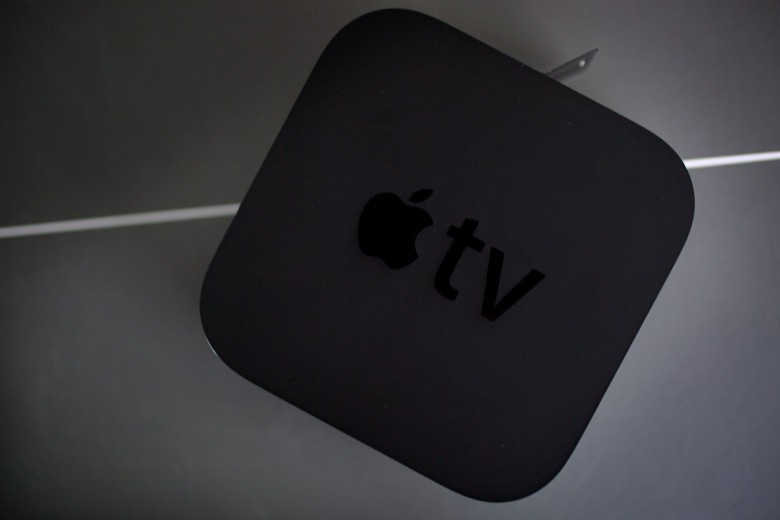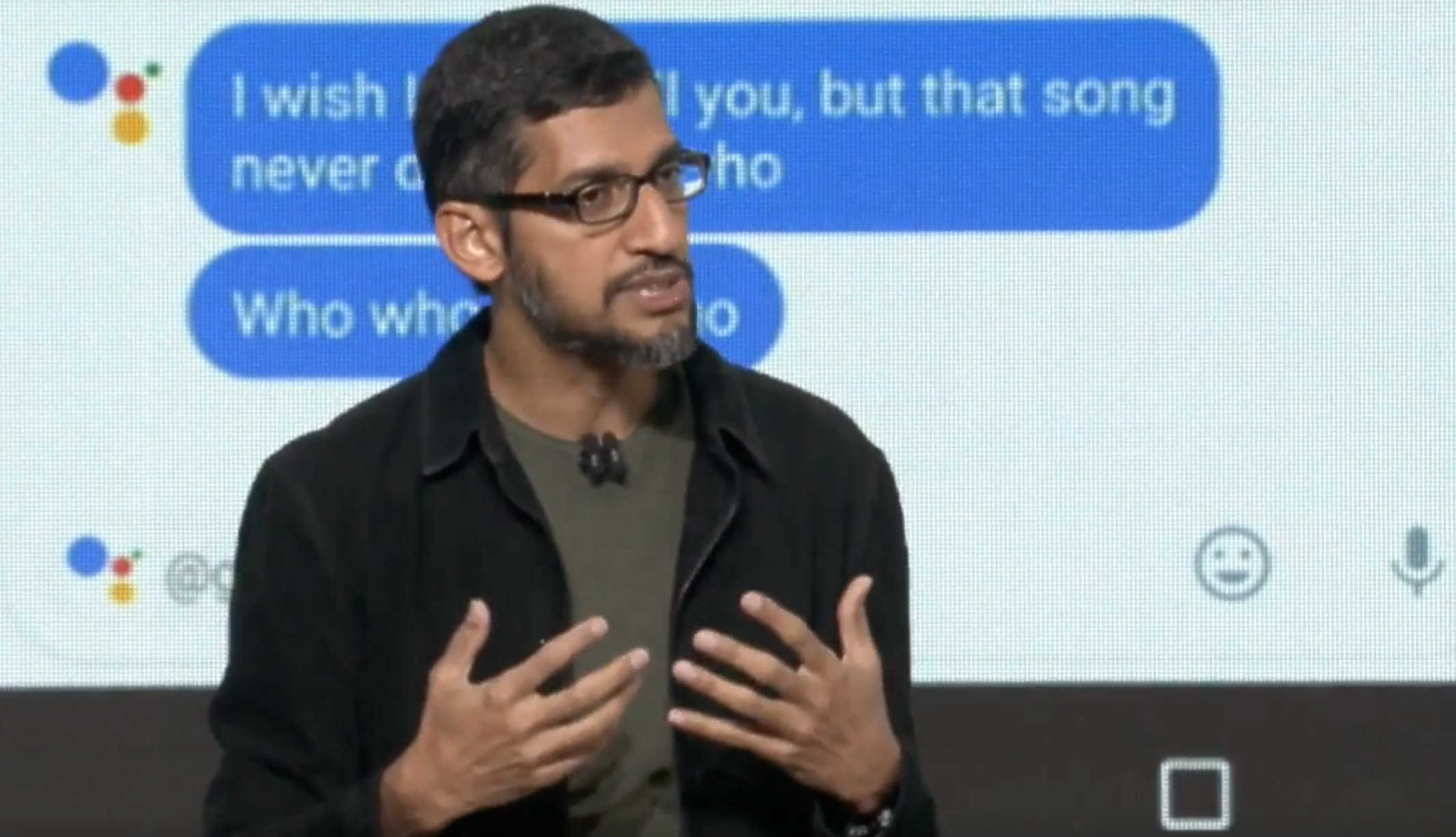After decades of showing us the best ways to interact with computers, Apple is lagging on the UI of the future — voice controls powered by smart, conversational AI.
Google, on the other hand, is placing artificial intelligence, in the form of Google Assistant, at the center of its new Pixel smartphones and Google Home smart speaker.
Cupertino’s mastery of the user interface is legendary: Macs, iPods and iPhones made the GUI, the mouse, the scroll wheel and multitouch mainstream. But Apple needs to get into the AI conversation if it’s serious about securing a place in our gabby future.
During Tuesday’s press event, which showed off the new phones, speaker and a VR headset called Daydream View, Google CEO Sundar Pichai acknowledged that it’s early days for Google Assistant. But he promised the AI would continuously improve and envisioned a day where it will become possible to build “an individual Google for each user.”
The hardware looked nice, but the always-on AI stole the show.
“Our vision for the Google Assistant is to be universal, to be there everywhere the user needs it to be,” Pichai said. While the Pixel phone will put Google’s AI front and center, Google Home is where it will really shine. That’s where we live, after all. And that’s where we will most naturally interact with AI assistants using voice commands.
Siri and Alexa: Dumb and dumber
First, let’s acknowledge the elephant in the room. Siri can be remarkably stupid.
For every text message dashed off successfully by voice using Apple’s AI assistant, there’s a simple question that yields ludicrous results. Alexa, the brains behind Amazon’s always-listening Echo and Dot speakers, isn’t going to win a genius contest anytime soon either.
Siri is not necessarily there when you need her, either. On Apple TV and older iPhones, Siri remains a button push away (although the “Hey Siri” feature, which works with iPhone 6s and newer models, makes the AI helper a bit more ubiquitous).
Amazon’s smart speakers nail the always-on experience, though, by making voice commands in the home pleasantly plausible. Despite Alexa’s occasional dimwit response, Amazon’s speakers deliver a voice-controlled experience that’s reminiscent of the type of human-computer interactions Star Trek promised us generations ago.
With Google Home, the new smart speaker that looks a little bit like a Renuzit, that sort of sci-fi experience looks poised for a massive leap forward.
All hail Google Assistant
Like Google’s new Pixel phones, Google Home is powered by Google Assistant, which harnesses the search giant’s massive knowledge graph to deliver results that make sense. And like Alexa, Google Home will be constantly listening, always at the ready to do your bidding. (Unless you push the mute button.)
Apple is rumored to be working on a similar device, possibly with facial recognition built in, but we appear to be a way from seeing it on the market.
Apple TV works as a smart home hub right now, but if you want to issue spoken commands, you’ve got to find that super-slim remote and press a button before you open your mouth. And Apple TV, while getting more useful all the time, remains tethered to Siri’s subprime AI.
I’m willing to bet that the lack of core voice functionality is one big reason HomeKit — the ambitious home automation platform Apple unveiled at its Worldwide Developers Conference in 2014 — continues to languish, with relatively few HomeKit- compatible products on the market.. (Multiple developers have told Cult of Mac that Apple’s rigorous security standards have slowed down HomeKit as well.)
Apple TV isn’t listening

Photo: Jim Merithew/Cult of Mac
If Apple wants the Apple TV to be a true home hub, it needs to work by voice.
It’s one thing to set up a rule that turns on your lights and fires up the heater when you pull your car into the garage. It’s another to be able to issue voice commands — “turn off the kitchen lights,” “play some Ozzy-era Black Sabbath,” etc. — and have these things happen reliably and with zero effort.
If you’re talking about a smart home, you’re talking about a home you can talk to. If you’re stuck memorizing voice commands, you’re stuck in the clunky past.
Amazon’s Alexa offers a taste of the better, smarter future. It might sound like hyperbole, but using Alexa on an Amazon Echo is truly transformative. Ask Alexa to set a timer, play a song or tell you the temperature a few times, and you’ll soon find yourself wanting to say “turn down the lights,” even if you don’t own a single smart bulb.
Siri works similarly well with straightforward, well-defined tasks. But lacking an array of far-field microphones like the ones in Amazon’s speakers and Google Home, Siri comes up short.
Adding Google’s AI to the mix will make this type of human-computer interaction even more commonplace, especially once so-called Conversation Actions open up “back and forth” interactions. (Google’s demo used the Uber app as an example: Conversation Actions would allow you to say, “Call me an Uber.” Then the Uber app could ask where you were going, what size car you wanted, etc.)
If Google Home can match Alexa’s voice-recognition capabilities and also put the internet’s default knowledge base at your beck and call, all in a package that enables seamless interaction, we’ll all be talking to computers much more frequently.
Some people worry about the privacy implications of an always-listening gadget, and for those people, Google Home includes a mute button. For the rest of us, the utility of a truly useful AI assistant will outweigh any paranoid thoughts.
Google’s open embrace of AI
[contextly_auto_sidebar]
During Tuesday’s demo, Google Assistant looked very advanced. As quick as Alexa and as smart as Google, it delivered relevant responses that sounded much less stilted than almost anything Siri does.
Yes, I realize this was a demo, and that demos aren’t the real world.
But anybody who has ever used the Google app on an iPhone knows that it delivers actionable information no matter the request, whereas Siri works from a scripted playbook that works for certain queries but just can’t compete (at least not yet). Google Assistant, described by the company as “your own personal Google,” is driven by the deep learning that powers Now Cards and other increasingly useful Google products.
Even more powerful, Google’s emphatic embrace of open systems means that working with third-party services like Uber and IFTTT will be a part of Google Assistant’s DNA. Just as Alexa offers Skills and Apple TV works with apps, Google Home will undoubtedly empower third-party developers to craft useful add-ons.
Google Assistant delivers AI to the masses
https://youtu.be/nWiIWyCeZso
We’ve all heard the chatter about Apple’s lack of innovation and slowness to roll out new features. Everybody knows Apple doesn’t really care about being first. And the company clearly prizes privacy, even if it may hamper its own artificial intelligence pursuits.
But while Cupertino’s deliberative approach arguably produces the finest hardware anywhere, Google is pushing the innovation envelope when it comes to delivering an AI assistant that works in real-world scenarios.
What’s the real risk to Apple?
Google’s track record when it comes to hardware is spotty. But if Google Assistant proves as good as it looked during the Google Home and Pixel phone demos, there could be trouble in Cupertino.
Every lame response from Siri will make us less likely to use Apple’s AI assistant the next time. Every brilliant response from Google Home will make Siri seem stupider in comparison, this is why Apple’s Amazon and Google are in the battle with their favorite smart technology devices for a long time now – Alexa vs Google home.
Apple showed everyone how to make computer, touchscreen and AI interfaces work in the real world. Thanks to Apple, we’ve fully embraced easy-to-use computers, sleek smartphones and powerful tablets. And we’re even getting used to talking to our devices, a concept Siri pioneered.
Now, Google looks ready to take control of the conversation when it comes to human-computer interaction. Let’s hope Apple’s AI hiring spree means Cupertino is crafting a witty (yet sensible) rejoinder.


